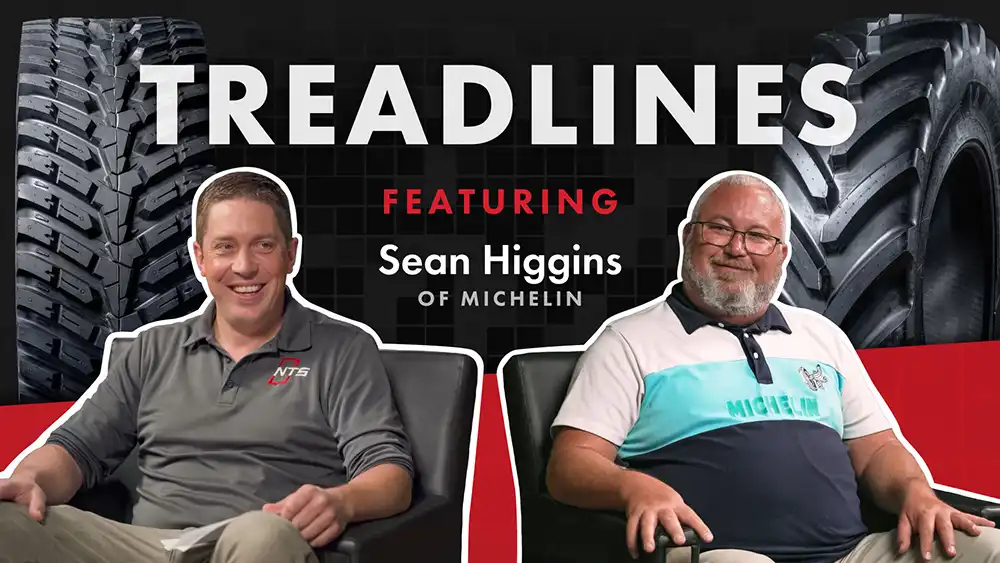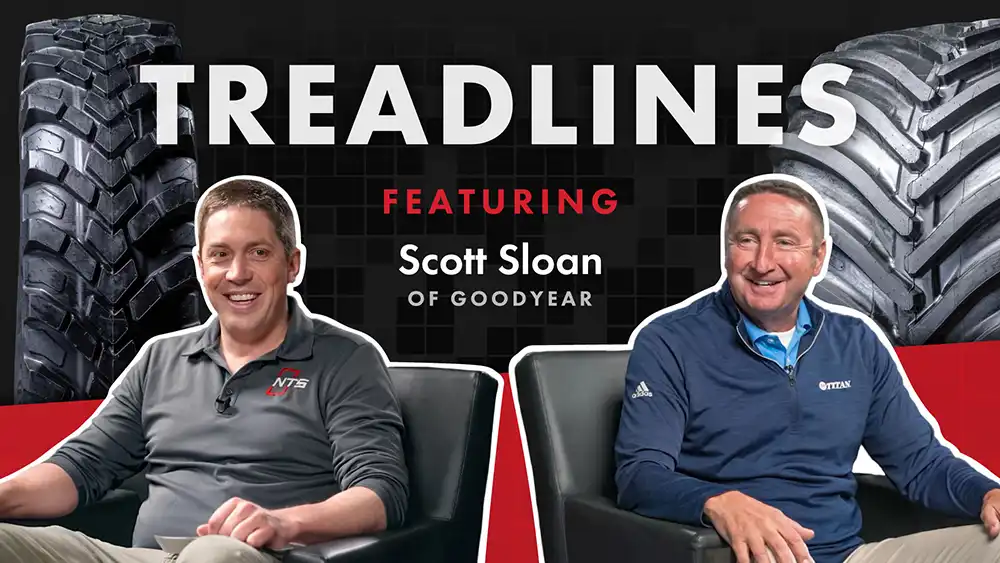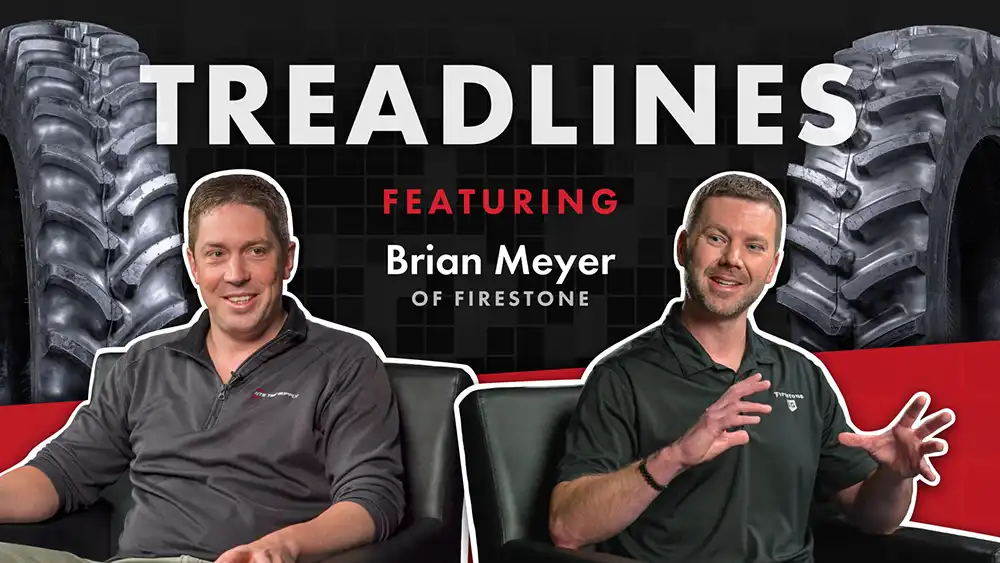If you want to keep your harvest rolling smoothly, you have to keep your grain cart rolling smoothly. Let’s face it—your cart is one of the hardest working implements on your farm, load after load. Your cart’s tires play a big role (literally) in a day’s worth of carting. Since they’re running over stubble all day long—and sometimes all night long—you need tough tires that can handle both hazards and the huge swings in weight from empty to loaded.

The good news is, there are several excellent tire brands and models on the market that we can recommend based on our own experience and customer feedback. Below we’ve shared seven of our favorites to help you maximize uptime and avoid a costly and time-consuming tire failure in the middle of the busiest season of the year.
But first, there’s another problem besides tire failure you’ll invite into your fields with inferior tires—deep soil compaction. Not only will the wrong tires weigh on your mind (will they survive harvest this year?), they’ll weigh on your future productivity too.
Deep Soil Compaction Hurts Your Yields. And tillage won’t help.
A multi-state study1 conducted by Penn State University from 1988 through 2002 showed that deep soil compaction can lower corn and soybean yields by 5 percent for 12 years even with no additional soil compaction and the best tillage practices. The conclusion, confirmed over multiple test plots, was this: introducing deep soil compaction into your fields can have a huge impact on your bottom line. An impact that can haunt your profitability for more than a decade.
How does deep soil compaction occur? Look no further than your heaviest implements and the tires they wear. Using the NTS Tire Supply Grain Cart Tire Configurator, it’s easy to see how the wrong tires can lead to deep soil compaction.

Let’s illustrate the problem using a 750+-bushel grain cart with 30.5-32 rubber as an example. With bias-ply tires, you have an 800 in2 total footprint with a soil compaction rating of 53—fairly high. Upgrade to a VF 900/60R32 radial tire (plus, use your existing rims) and your cart will now have a 1,490 in2 footprint with a soil compaction rating of 27.
The truth is, low-tech bias tires aren’t up to the task of supporting today’s heavy loads while also protecting your long-term yields. A bias tire’s rigid construction doesn’t allow for any sidewall flex, which leads to uneven weight distribution and, eventually, dreaded deep soil compaction. A radial’s longer, flatter profile results in more square inches of ground contact, allowing your soil to better absorb the weight of your cart.
Mount Larger Grain Cart Tires
If you want to upgrade your grain cart's tires, you should think not only about switching to radials if your cart is still wearing bias tires, but also think about super-sizing your tire setup.

These are just a few examples of cart tire size upgrades. Other possible sizes include LSW800/50R42, 1100/45R46, and 1250/35R46. The bottom line is this: Don't try to figure out a grain cart tire package upgrade by yourself. Call the farm tire experts at NTS Tire Supply and let us help you find the right fit for your cart. We'll let you know your options and get you a quote fast so you can keep harvest prep rolling along on your farm.

Make Larger Tires Fit with Custom Wheels from NTS
You're often going to need wider wheels when sizing up your grain cart's tires. Here's where you can run into issues: Some carts have adjustable axles, while other don't. Or, even with an adjustable axle you might run into a clearance issue with wider or taller tires. No problem. This is where you can lean on our custom wheel capabilities. Yes—we manufacture our own custom wheels in house. Whether we're starting from scratch or modifying used wheels we have on our lot for your project, we can make you the tire and wheel package you need to curb deep soil compaction in your fields.
Our Top 7 Grain Cart Tires

1. Michelin Cerexbib 2
Michelin’s Cerexbib 2 utilizes the company’s Ultraflex technology, which allows it to carry enormous amounts of weight at lower air pressure. The tire’s footprint is 15 percent larger than Michelin’s Cerexbib model and 35 percent larger than its Megaxbib model. This translates to greater flotation for better soil protection and less compaction. Michelin's Cerexbib 2 grain cart tires are covered by a 6-year manufacturer's warranty. With long lasting tread and fantastic resistance to stubble damage, the CerexBib 2 is our first pick for outfitting your cart with tires designed for the demands of a busy harvest.

2. Michelin Cerexbib
As with the Cerexbib 2, the Cerexbib features Ultraflex technology and hazard-resistant tread for a winning combination of flex and toughness. This translates to less soil damage from compaction and a smaller chance that you’ll suffer a tire failure due to tough-as-steel corn stubble. Michelin's Cerexbib grain cart tires are covered by a 6-year manufacturer's warranty.

3. Michelin Megaxbib 2
This is Michelin’s “value” tire for larger harvesters, sprayers, and carts. With Stubble Shield technology and high-coverage tread lugs, the Megaxbib 2 protects against stubble damage while offering impressive load capacity and excellent roading. Michelin's Megaxbib grain cart tires are covered by a 6-year manufacturer's warranty.

4. Firestone Maxi Traction
Incorporating Firestone’s Advanced Deflection Design (AD2), the Maxi Traction can lug impressive loads at lower air pressures, which results in a long, flat footprint for less compaction in the field. The tire’s dual-angle technology further reduces disturbances to the soil. Firestone's Maxi Traction grain cart tires are covered by a 9-year manufacturer's warranty.

5. Firestone Radial All Traction 23º
Built from two distinct rubber compounds, the All Traction 23º is flexible at the sidewall for a more generous footprint and increased resistance to cracking and weathering. A tough tread compound helps ensure longer life. The tire’s open-center tread helps prevent mud buildup—a plus if you want to avoid dragging your soil halfway home. Firestone's Radial All Traction 23° grain cart tires are covered by a 9-year manufacturer's warranty.

6. Alliance 372 Agriflex+
Incorporating both structural and rubber compound advancements, the 372 Agriflex+ is designed for maximum flex to ensure a longer, wider footprint for greater flotation and less compaction. Stubble Guard technology helps protect you from a catastrophic tire failure that would bring your harvest to a halt. Alliance's 372 Agriflex +grain cart tires are covered by an industry leading 10-year manufacturer's warranty.

7. Alliance 376 Multistar
The Multistar’s tough steel-belt-reinforced casing ensures stable tire dimensions under load for a dependable tire footprint to help you combat compaction. Stubble Guard technology and a durable sidewall help ensure long tire life. Alliance's 376 Multistar grain cart tires are covered by an industry leading 10-year manufacturer's warranty.
Roll Easy with the Right Grain Cart Tires and Right Air Pressure
In addition to outfitting your cart with quality tires that have proven durable in real-world conditions again and again, you also have to remember to check and, if needed, adjust your air pressure. Running high-tech tires at the wrong pressures can rob them of any of the benefits you expect to see, such as reduced soil compaction and maximum uptime.
If you’re in the market for cart tires and want to avoid a time-consuming, harvest-halting tire issue—or yield-robbing deep soil compaction—call NTS Tire Supply today. We’ll help you outfit your grain cart with a set of tires that will help keep it in service this harvest season and beyond. We're here to help Drive Your Farm Forward.
Interested to know the level of compaction your current grain cart tire setup is causing? Use our Grain Cart Tire Configurator to find out

1. Daum, D.R. & Shipp, R.F. (2004). Agricultural soil compaction – causes, effects, and cures (Penn State University publication B-79)

.png)
.jpg)



















